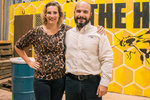
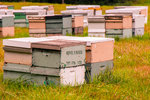
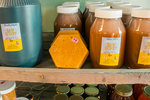
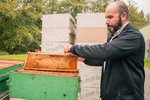
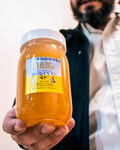
Editor’s Note: The Chronicle is working to assist local businesses suffering from the effects of the COVID-19 virus spread and associated government orders to close or limit commerce. There will be a feature on a local business in each edition of The Chronicle and at chronline.com moving forward. To be considered, email reporter Eric Trent at etrent@chronline.com. Additionally, The Chronicle will continue to offer its coverage of the coronavirus and its effects across the community, state and nation free outside of our paywall at chronline.com.
ROCHESTER — Kevin Mills’ introduction to honey bees was unlike most people’s.
Mills, a young kid living in Manitoba, Canada, at the time, was pressuring his father to let him have his own beehive. Problem was, his father was worried about him keeping bees because he had never been stung before and wasn’t sure if he was allergic to them.
So his father asked an old beekeeper in the area if he would take his son out to get stung a few times. The beekeeper took that as a challenge. He brought Mills out to a hive of bees, opened the lid and told him to peer inside. As soon as Mills looked inside the beekeeper slammed the lid down on his head and Mills was stung eight times on the face.
“I was too scared to go around a hive for about two or three years after that,” Mills said.
That would be enough to give some a lifelong fear of hive dwellers. But by the time he was 13 years old, he reckons enough emotional healing had taken place that he was ready to buy his own hive and get started in the world of beekeeping.
“I’m not sure whether that reflects on my hardheadedness, my stupidity or both,” Mills said.
When he first moved to Rochester to pursue a music career with his band, one of his bandmates became interested in bees and asked Mills if he would take care of his hive if he bought one. Mills said, “sure,” and sold his wife, Amanda, on the idea of also buying two hives for himself. He was also pleasantly surprised to find a beekeeping supply store just down the road from him.
What was supposed to be only three colonies ended up ballooning to 90 colonies by the end of that year. By 2015, Mills had started his own business, Hive 5 Bees, just north of Grand Mound. The following year, he opened his new restaurant Mills Diner in Rochester.
“It kind of morphed from the hobby to the business side rather quickly,” Mills said. “I didn’t even foresee it. But, like I said, I love bees.”
Mills and his wife currently have around 600 hives on their plot of land just off Interstate 5 that borders Scatter Creek. It’s been a rewarding rebound for the Mills, who lost 90 percent of their colonies two years ago during a rough winter. Since then, they’ve been building their numbers back and hope to double their current hives to about 1,200 colonies.
Hive 5 Bees offers its own honey, obviously, though the bulk of its business comes from almond pollination and selling nucleus colonies, which are starter colonies of bees. A lot of its customers for nucleus colonies come from Seattle, Portland and Eastern Washington.
For almond pollination, almond farmers in California pay to rent bees from Mills to pollinate their trees. It’s a shift that’s starting to take place in the beekeeping world, rather than honey production, Mills said. There’s been a dive in honey production in the U.S., Mills said, and he averages 25-30 pounds of honey per colony now.
So now he’s focusing more on almond pollination as almonds are not wind-pollinated and require honey bees to produce nuts. Almond farmers will pay him a standard rate of between $190-$200 per colony, and it’s become a pretty good moneymaker for the Mills family.
They can haul up to 408 colonies on their standard 48-foot flatbed truck on average. They typically head to California the first week of January and the pollination takes around six to eight weeks. The Mills leave with around $80,000 in earnings and healthy colonies with almond pollen.
It’s also a win-win situation for Mills as the almond pollen is especially nutritious for honey bees, providing all 10 of the amino acids their diets require.
“Bees really build up beautifully, they look great after the almond pollination,” Mills said. “I’ve often joked that taking your bees down to California would be worth it simply for what it does for your bees, nevermind the pollination fee. It’s a pretty fascinating process.”
One of the biggest challenges currently in the beekeeping industry is that most honey that U.S. consumers are buying in stores has been blended with honey that’s been imported. Sixty-eight percent of the honey consumed in the US in 2019 was imported, according to the National Honey Report.
Some honey packers will be misleading in making their honey appear as if it is a U.S. product, when it may only partially contain U.S. honey. And many imported honeys contain antibiotics that are banned in the U.S. Others contain added syrups or sweetener extenders that are not made by bees in the hive, according to True Source Honey, a traceability certification organization. No one knows for sure how much of honey today is faked. The Honey Authenticity project reported that about a third of honey in international trade is adulterated or 100 percent false.
“The biggest thing for consumers is to really be aware; that they know the beekeeper that they’re buying their honey from,” Mills said. “Obviously it helps the beekeeper, too, because beekeepers are having a hard time staying in business around honey production because of all the importation of much-cheaper honey.”
Raw honey can be purchased from Hive 5 Bees from its website at Hive5Bees.com, by telephone at 757-376-2821 or by email at RochesterBees@gmail.com.
•••
Reporter Eric Trent can be reached at etrent@chronline.com. Visit chronline.com/business for more coverage of local businesses.